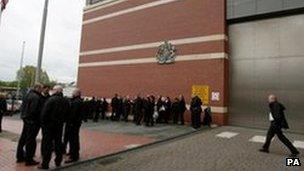Public sector strikes: Prison officers return to work
- Published

Prison officers protest outside HMP Manchester on Thursday
Prison officers in England and Wales have returned to work after walking out in protest at government plans to raise their retirement age from 65 to 68.
Prison Officers Association (POA) general secretary Steve Gillan said the union had achieved its aims.
"We're extremely proud of our members for taking the action that they did to highlight the coalition government's attitude towards prison officers."
The government said it would no longer attempt to obtain a protest injunction.
It is illegal for prison officers in England and Wales to strike, but the POA said they were holding "protests".
The POA told its members that from 07:00 BST only "minimum cover" should be provided in jails.
Scottish prison officers are able to strike and are not subject to English law or action by the UK government.
'Phase one over'
The POA estimated that 80% of its members in England, Wales and Scotland took part in Thursday's action.
General secretary Steve Gillan said the union's national executive made the decision to tell its members in England and Wales to return to work as normal at about 13:30 BST.
"We as a trade union have asked them to go back to work because we believe that we have achieved everything that we can today," Mr Gillan said.
"Phase one of our strategy is now over so we've told members to return to work as normal."
By 15:25 BST prison officers in Scotland had also returned to work.
Mr Gillan denied the industrial action had been ended because of the government's threat of an injunction.
"We're happy to take it to the wire. We'd much rather get the government round the table but we don't rule out further action in the future," he said.
Mr Gillan said the government's move to raise the retirement age was "not a wise move" and was "completely unfair to dedicated professionals who do a most difficult job on behalf of society".
In 2007, the POA agreed the normal pension age for new prison officers would be 65, in line with all other civil servants.
Speaking before the action was called off, POA chairman PJ McParlin told BBC Radio 4's World at One programme his members should not be forced to work longer.
"We have thousands of assaults every single year that my members have to intervene with and respond to," he said.
'Constructive discussions'
Mr McParlin said prison officers could not take industrial action because they were defined as "an essential service". "But they're quite happy for prison officers to work on til 68," he said.
"We won't be retiring with dignity from service, my members will be dying in service."
Mr McParlin insisted the action was legal.
Michael Spurr, chief executive of the National Offender Management Service (Noms), said he was "extremely disappointed" the POA had decided to strike.
"The government has been in constructive discussions with the POA about further pension reform and it is deeply regrettable that this action has been taken now."
He later added: "Our contingency measures were effective and I am grateful to those staff who kept our prisons safe today."
Around 100 POA members on the 07:00 shift gathered for a "protest meeting" outside HMP Manchester, formally known as Strangeways, on Thursday morning.
Some staff agreed to stay inside to ensure the Category A prison's 1,200 inmates were fed and given medication.
Brian Lord, HMP Manchester branch secretary for the POA, said raising the retirement age would be "unsafe".
He said prison officers' pay ranged from £21,000 to £28,000 but that cuts could see that fall to £26,000.
Earlier, prison officers held a protest outside HMP Cardiff over concerns about health and safety, union officials said.
- Published10 May 2012
- Published10 May 2012
- Published10 September 2012